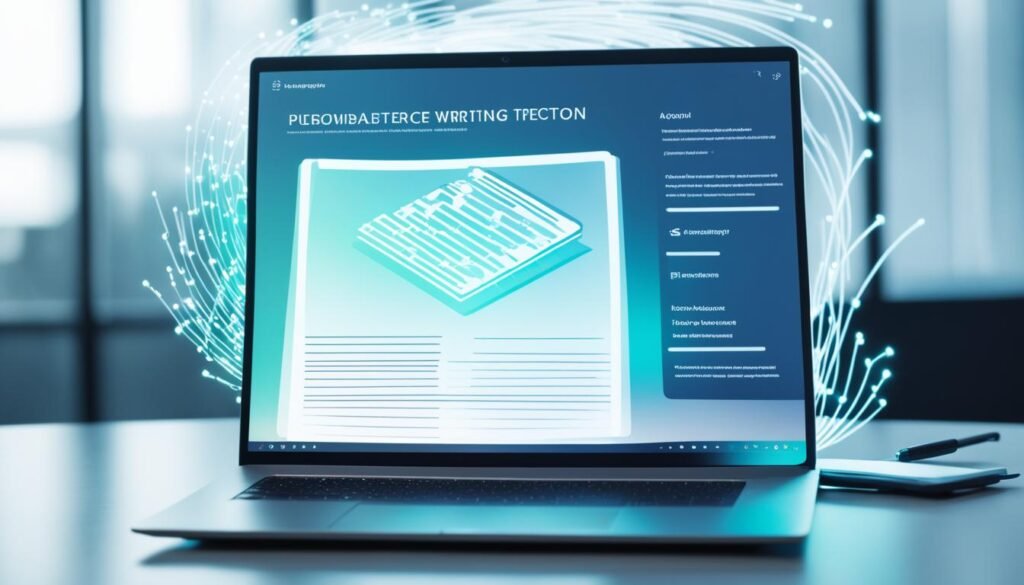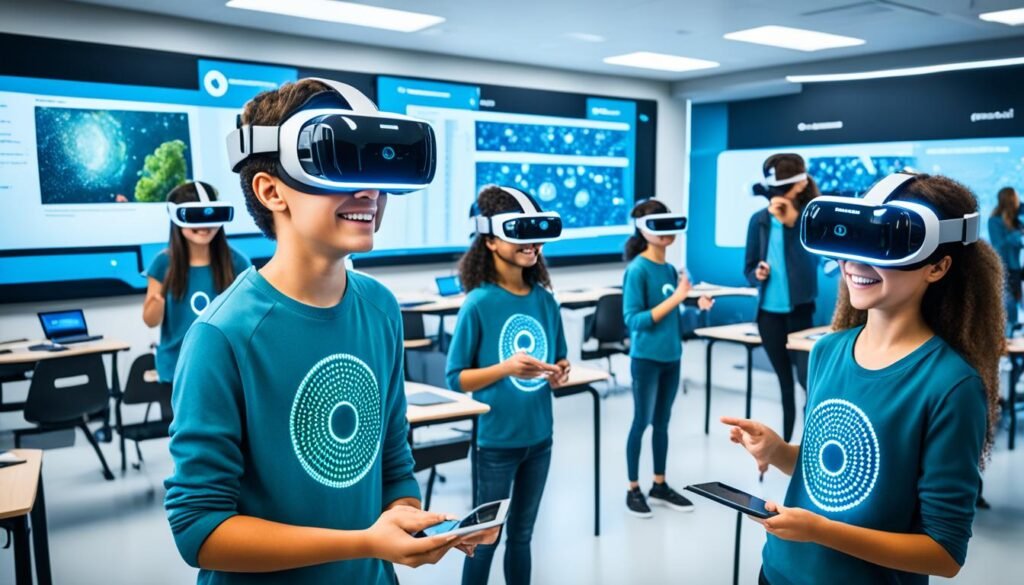Did you know that students who used AI-powered practice quizzes saw a 15% boost in their test scores? This finding from a University of Edinburgh study shows how AI is changing education. It’s a big deal for students and teachers alike.
AI is now a key player in helping students succeed. It offers customized quizzes, lesson plans, and writing help. This means you can study better and reach your goals. AI makes learning personal, keeps students interested, and helps them do better in school.
Key Takeaways
- AI-powered practice quizzes can improve standardized test scores by 15%.
- Personalized learning approaches can increase student retention rates by 5-10%.
- AI writing tools can enhance grammar and critical thinking skills by 12% and 8%, respectively.
- AI-enabled personalized learning experiences can boost student motivation and engagement.
- AI can assist teachers in creating high-quality instructional materials that enhance student learning.
The Rise of AI in Education
Artificial Intelligence (AI) is changing education, giving students new tools to improve their learning and do better in school. AI helps make learning personal, focusing on what each student needs and likes.
Personalized Learning Experiences
AI looks at student data to make learning paths just for them. This means students can learn at their own speed and get help where they need it most. AI helps students learn in ways that work best for them, making learning easier and more effective.
AI-Powered Intelligent Tutoring Systems
AI helps create systems that act like personal tutors. These systems give students instant feedback and help, making learning easier. They adjust to what each student needs, helping them understand tough subjects better.
| Key Statistic | Insight |
|---|---|
| The e-learning market is projected to be worth over $460 billion by 2027. | The rapid growth of the e-learning industry highlights the increasing demand for personalized, technology-driven educational solutions. |
| Research by the organization that produces the ACT shows that students with higher academic performance are more likely to use AI tools compared to their lower-performing peers. | This suggests that AI-powered learning tools have the potential to bridge the achievement gap and support students of all skill levels. |
“AI has the power to revolutionize education, empowering students to reach new heights in their learning journeys.”
As AI grows and becomes more part of education, the way we teach and learn is set to change. This change brings new chances for students to grow and succeed in school.
AI-Generated Practice Quizzes
AI-powered tutoring systems are changing how students learn and check their knowledge. These systems offer quizzes for many subjects. They help students check their knowledge, get feedback right away, and see where they need to improve.
Self-Assessment and Immediate Feedback
AI-generated quizzes let students check their understanding in real-time. They get feedback right away and see what they know well and what they don’t. This helps them focus on what they need to work on more.
Identifying Knowledge Gaps
These quizzes help find out where students struggle the most. Teachers can then give them the help they need. This way, students can improve faster in their studies.
A study by the University of Edinburgh found that AI quizzes helped students do 15% better on tests. This shows how powerful these tools can be in education.

As AI becomes more common in schools, AI quizzes are changing how students learn. They help students check themselves, get feedback fast, and find where they need help. This makes learning more personal and effective.
Personalized Study Plans
AI is changing how students learn, moving away from one-size-fits-all methods. Now, AI helps create study plans that fit each student’s needs and how they learn best. These systems use data to make learning easier by breaking down hard topics into smaller parts.
Tailored Learning Pathways
AI tutors look at a student’s grades, interests, and how they like to learn to make learning paths just for them. They use this info to make lesson plans that keep students interested and help them remember more. Over 47% of learning systems will use AI in the next three years, showing how big of a change this tech is making in education.
Progress Tracking and Accountability
AI also helps students track their progress in real-time. With tools like data visualizations and reminders, students can stay on track and see where they need to work harder. A study by the Babson Survey Research Group found that personalized learning can increase student retention by 5-10%.
AI is giving students the support they need to do well in school. With customized schedules and tracking tools, AI is changing how we learn. It helps students reach their highest potential.
AI-enabled Writing Support
In today’s world, AI-powered writing tools are key for clear and impactful writing. They offer features to help students at every step, from making outlines to improving sentences. These tools make writing easier and more effective.
Structured Outlines and Essay Drafting
AI tools help students start their writing by making detailed outlines. They look at the assignment and find the main themes and arguments. Then, they suggest a structure to organize the content.
This gives students a clear plan. They can then work on their ideas and tell their stories well. Starting with a plan makes writing less scary.
Real-Time Writing Assistance
As students write, AI tools give them feedback and help in real time. They check the text, find what needs work, and offer better ways to phrase things. This helps students improve their writing, make stronger arguments, and make their work clearer.
A study in the Journal of Educational Technology & Development showed great results. Students using AI tools got better at grammar by 12% and critical thinking by 8%.
With ai educational tools, students can become better writers. ai research assistance helps them in the creative process. And ai collaborative learning makes their work more precise and confident. As technology grows, AI will change how students write and succeed in school.

“AI writing tools are a game-changer for students, empowering them to unlock their full potential as writers. These innovative platforms provide the guidance and support needed to craft compelling, well-structured essays that showcase their critical thinking and communication skills.”
– Bill Hart-Davidson, Associate Dean of Research and Professor of Writing, Rhetoric, and Cultures at Michigan State University
Empowering Educators with AI
AI is changing fast, and education is a big winner. AI tools and technologies are helping educators do their jobs better. They make learning more personal and help teachers inspire students.
AI is making a big impact by taking over automated administrative tasks. Teachers can now grade papers, make custom rubrics, and track student progress with AI’s help. This gives them more time for planning, talking with students, and helping each student learn better.
AI lets teachers tailor learning to each student’s needs. It uses data to adjust the learning materials, making them more engaging and effective.
AI also helps with virtual teaching assistants. These assistants answer simple questions, keep an eye on discussions, and guide complex questions to the right teachers. This lets teachers focus on giving personal advice and building strong student relationships.
As AI in education grows, teachers need to learn how to use it well. Programs like those from ASU Prep are teaching them about ai classroom management and ai educational tools. This way, teachers can use AI to make learning better for everyone.
“AI is reshaping various industries, including education, and is empowering educators in creating humanized and engaging learning experiences.”
– Wall Street Journal, May 8, 2024
By using AI, teachers can offer more personalized learning and make their work easier. This leads to a better learning experience for students and teachers alike.
Future-Ready Skills Development
AI is changing how we learn and teach, making students ready for the future. With AI educational tools, AI research assistance, and AI collaborative learning, students get a strong skillset. This goes way beyond just knowing tech stuff.
Today’s job world moves fast because of technology. Students need to be ready for this fast-changing scene. AI tools help them improve skills like critical thinking, solving problems, and talking well. These skills are important for any job they might have in the future.
AI also makes collaborative learning better, letting students work together on projects. This helps them get better at teamwork and working with others. It gets them ready for the real world and teaches them important things like emotional smarts and being flexible.
“AI is not the end, but the beginning – the first steep ascent of the cliff of progress.” – Winston Churchill
By using AI, schools can make students future-ready. They’ll have the skills and mindset to do well in a changing world. As AI changes education, students can look forward to a future where they can reach their full potential. Their paths to success will be filled with new, personalized ways of learning.

Ethical Considerations and Challenges
As we use ai educational tools and ai personalized learning, we face ethical issues. We must think about data privacy, fairness, and how technology fits into teaching. It’s important to use AI’s benefits while keeping the human touch in education.
Data privacy is a big worry. AI systems gather lots of student data, like personal info and how well they do in school. We need to make sure this data is kept safe and used right, to protect students’ privacy.
Equity is also key. ai educational tools and ai personalized learning could make learning better, but they could also make things worse for some students. We must make sure AI doesn’t unfairly treat certain students, like those from less supported areas.
There’s also debate about technology’s role in education. AI can make learning more personal, but some worry it might replace teachers. Others think we’re using technology too much, losing the value of face-to-face learning.
To tackle these issues, we need to work together. Teachers, policymakers, and tech experts should join forces. We need strong rules for using AI in schools, to be open, and to build trust and accountability.
By using AI wisely, we can make a future where tech and human skills help students reach their best potential.
how ai can help students
AI is changing education fast, making it a key tool for students to do well in school. With AI’s help, students can learn in a way that fits them best. They get quizzes, study plans, and help with writing.
AI makes learning personal. It looks at what students are good at and what they need to work on. Then, it gives them content and activities just for them. This keeps students interested and helps them do better in school.
AI also makes quizzes that change based on what students know. These quizzes give feedback right away and show where students need more help. This helps students take charge of their learning and understand better.
AI helps with writing too. It can make outlines, start essays, and check grammar and style. This makes students’ writing better and helps them think more deeply.
“AI in education has the potential to create personalized learning experiences, improve student engagement, and optimize learning outcomes.”
As AI becomes more common in schools, we need to use it wisely. We should use it to help students learn but also to keep them creative and critical thinkers. This way, AI can really help students reach their goals.
Personalized Learning and Adaptive Assessments
AI helps by looking at how students learn best and giving them what they need. This makes learning fun and helps students understand better. It also makes them do better in school.
- AI makes quizzes that change based on what students know, giving feedback and showing what they need to work on.
- It gives personalized learning plans that guide students through lessons and resources, helping them stay on track.
- AI tracks progress and keeps students accountable, helping them take charge of their learning.
AI-Powered Writing Assistance
AI tools can really change how students write. They help with outlines, drafts, and checking grammar and style. These tools make students’ writing better and help them do well on assignments.
- AI helps with essay outlines and drafting, making it easier for students to organize their ideas.
- It gives feedback on writing in real time, helping students make their work better.
- AI helps with citations and formatting, making sure students follow the rules and keep their work honest.
As AI becomes more common in education, we need to use it wisely. We should use it to help students learn but also to keep them creative and critical thinkers. By doing this, AI can really help students reach their goals.
Collaboration: The Human-AI Partnership
The key to using ai educational tools in schools is not to replace teachers. It’s about working together. AI can take over simple tasks, letting teachers focus on teaching and inspiring. This partnership can make learning better for everyone.
Studies show that companies using ai collaborative learning do much better. AI helps with gathering info, processing data, and doing routine tasks. This lets people focus on more important work. Companies that use AI well get better at making quick decisions and personalizing services.
But, AI is getting better at doing jobs that people used to do, like diagnosing diseases and helping customers. This has made some worry about losing jobs. Schools are now teaching students the skills they need for an AI-filled future.
The National Science Foundation gave a big grant to a team at the University of Colorado Boulder. They also gave over $612,000 to Worcester Polytechnic Institute (WPI). The project is working on new AI algorithms to improve how we understand social signals. They’re testing this in two Colorado school districts.
By using tools like ai educational tools and ai collaborative learning, teachers can help students succeed in an AI world. They make sure learning stays personal and meaningful.
Success Stories: AI in Action
AI-powered tools and platforms are changing education for the better. They help students do better on tests and stay in school longer. This shows how important AI is in education.
Thinkster Math uses AI and human help to make learning personal. It looks at how each student is doing and changes the lessons to fit them. Thanks to this, students are getting much better at math.
Nuance’s speech recognition software is a big help for students who find writing hard or need extra help. It can write up to 160 words per minute. This lets these students join in learning without any barriers, helping them do well in school.
Cognii is an AI virtual learning assistant used in schools. It gives students personalized advice and support. By spotting where students need help, Cognii gives them the feedback they need to do well.
AI tools like Cram101 and JustTheFacts101 are changing how students study. They turn textbooks into smart guides with summaries, practice tests, and flashcards. This makes students ready for exams and tests.
AI isn’t just for students. Palitt helps teachers make custom lessons, lesson plans, and textbooks easily. This gives teachers more time to focus on helping students one-on-one.
As more schools use AI, the ways to help students succeed keep growing. By using these new technologies, schools can help students reach their goals and do their best.
“AI has the potential to transform education by enabling personalized learning experiences, providing real-time feedback, and empowering educators to better support each student’s unique needs.”
| AI-Powered Solution | Impact on Student Success |
|---|---|
| Thinkster Math | Personalized learning programs leveraging AI and human interaction to improve math proficiency |
| Nuance Speech Recognition | Transcription software beneficial for students with writing difficulties or accessibility needs |
| Cognii Virtual Learning Assistant | AI-based products that identify knowledge gaps and provide tailored feedback to learners |
| Cram101 and JustTheFacts101 | AI-powered study guides that transform textbooks into smart resources with summaries, practice tests, and flashcards |
| Palitt | AI-enabled tools that assist instructors in creating custom lecture series, syllabi, and textbooks |
Roadmap for Implementing AI in Education
As schools look into adding AI to their teaching, having a clear plan is key. This plan should cover things like setting up the right tech, training teachers, keeping data safe, and adding AI tools step by step. This makes sure AI is adopted smoothly.
Recent studies show that fewer than 10% of schools and colleges have clear rules for using AI tools. To fix this, schools should use a four-step plan for adding AI:
- Establishment Phase: Start with meetings and training on AI for important people like teachers and staff.
- Developing Staff Phase: Offer training for teachers to help them understand and use AI tools well in their classes.
- Educating Students & the Community Phase: Teach students and the community about AI to make sure everyone knows how to use it right.
- Assessing and Progressing Phase: Keep an eye on how AI is doing and check new tools to make sure they meet school goals and student needs.
It’s important to have teams that include leaders, teachers, students, and community members. These teams should keep training on using AI right, check AI rules often, and share the latest news and advice with everyone.
With a detailed plan and focus on getting ready for AI, schools can use AI tools to make learning better, help students do well, and get them ready for the digital world.
| Phase | Key Activities |
|---|---|
| Establishment |
|
| Developing Staff |
|
| Educating Students & the Community |
|
| Assessing and Progressing |
|
This detailed plan helps schools use ai educational tools, ai personalized learning, and ai classroom management to make learning better and prepare students for the digital future.

“AI has huge potential to change education, but it needs a careful and planned approach. This roadmap offers a way for schools to use AI tools fully while thinking about ethics and practical issues.”
Conclusion
As we start using AI in education, the future looks bright for students. AI brings personalized learning, smart tutoring, and new tools for studying and writing. It helps you reach your full potential and get the skills needed for the future.
But, we must use AI wisely to keep the human touch in education. By working together with AI and teachers, you get the best of both worlds. This way, your learning is more personal, supportive, and helps you think critically.
The future of learning is shaped by AI, but it’s still about people. As you move forward, grab the chances AI offers while watching out for its downsides. With careful innovation, we can make education better, more open, and successful for everyone.
FAQ
How can AI help students in their academic pursuits?
AI-powered tools give students personalized quizzes and lesson plans. They also offer advanced writing help. This helps students learn better, study more effectively, and reach their goals.
What are the benefits of AI-powered tutoring systems?
AI tutoring systems offer quizzes that interact with students, give instant feedback, and adapt to their needs. This helps students find and fix their knowledge gaps.
How can AI-generated practice quizzes improve student performance?
Using AI quizzes, students can see an average boost of 15% on tests. These quizzes help students check their progress and focus their studying.
What are the advantages of AI-powered personalized study plans?
AI helps create study plans that fit each student’s needs and learning style. This can increase student retention by 5-10%. It also tracks progress and schedules.
How can AI-powered writing tools assist students?
AI writing tools help with making essay outlines, giving feedback, and checking drafts. They improve grammar, critical thinking, and writing skills.
How can AI empower educators in the classroom?
AI can do administrative tasks, freeing up teachers to teach and understand students better. This helps teachers give better support and interventions.
What future-ready skills can students develop with the help of AI?
AI helps students improve in critical thinking, communication, and teamwork. This prepares them for the changing job market.
What are the ethical considerations in implementing AI in education?
We must think about data privacy, fairness, and the role of technology in education. It’s important to use AI in a way that keeps education human and balanced.
